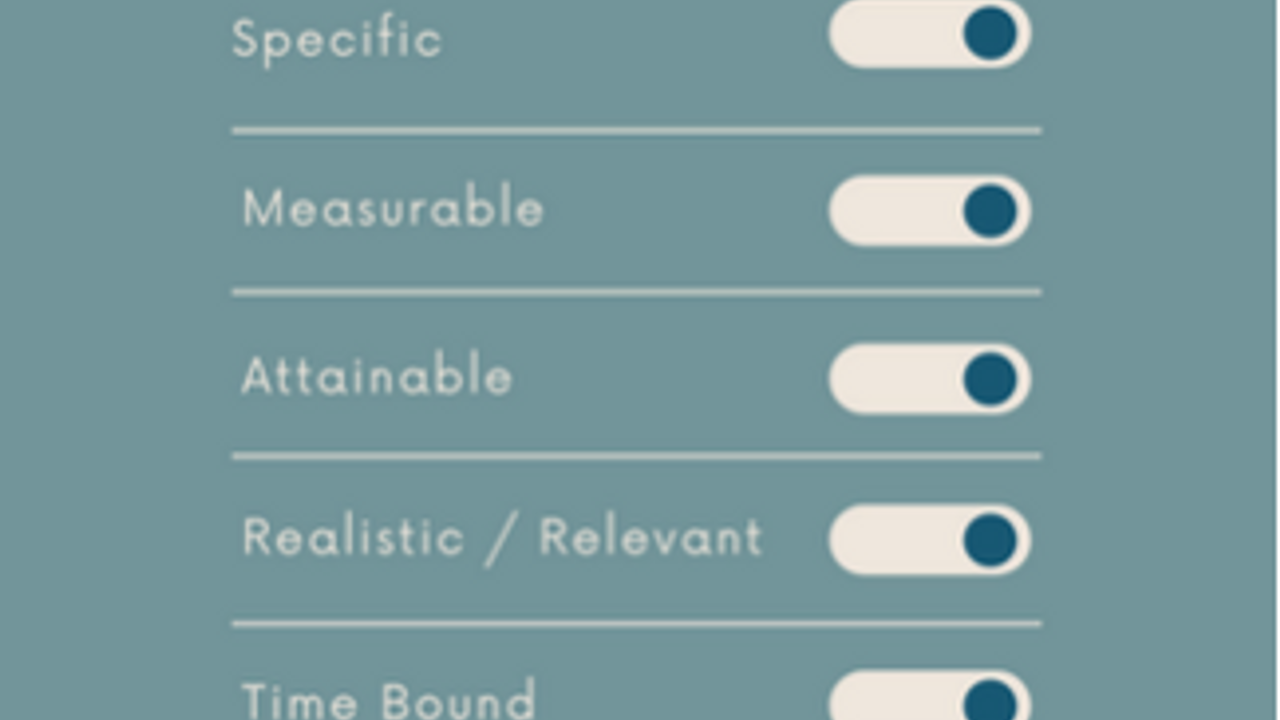Setting S.M.A.R.T Goals
Oct 17, 2021
In life, we're told to dream big. Reach for the stars. Go for the gold.
While I think everyone would agree that having big aspirations is admirable not to mention inspiring, it can also be overwhelming and daunting at times!
When it comes to dreaming big the best place to start is with small goals.
I know it may feel like that is a tad counterintuitive to start small, but remember that you want to set yourself up for success not burnout. Think about those common fitness goals so many people love to create.
How many times have you or someone you know set a huge goal to lose 20 pounds or more in a short period of time, or to commit to exercising six days a week, only to fall off the wagon a few weeks (or days) later?
The truth is that even when people have the best of intentions and the willpower to set out and do something grand, without a plan, they usually fail.
A dream is a great and sis I promise I want you to dream and I want you to DREAM BIG, but without a plan you dream is just that a dream.
On the other hand a goal is a dream with working boots on!
So let's talk about taking those BIG DREAMS you have and creating goals that include action verbs!!
It's common for people when first setting a goal to be full of energy, highly motivated, and focused on how their perfect self is going to crush this goal.
Unfortunately, most of us are rarely perfect all the time or if ever (I mean let's be real here!)
When we try to do too much, go too hard, push too soon we usually feel overwhelmed. And when the results don't come right away, or the situation is no longer "prefect" we lose faith, we lose momentum, we lose the desire to continue on.
So how can we set our selves up for success right out the gate? Start by setting progressive goals. Goals that build on one another to help propel you toward that big dream and inspiring aspirations.
Breaking a big goal into smaller, realistic goals can help you both mentally and physically. This method can also help keep you making progress as you continue build confidence in your capabilities.
The first step to setting realistic goals is to really think about your dream, write it down, envision it, define success of achieving it. What will it look like when you've made that dream a reality. What will it feel like?
Then break that dream into manageable goals.
Then, ask yourself these three questions:
1. How big is the goal? Does it need to broken down into smaller more manageable goals. Think months to years to achieve as the BIG goal, while days and weeks are the smaller goals or milestones to hit along the way.
2. What does it take to achieve the goal? This question addresses your goal's frequency. If reaching your goal requires five workouts a week, but you can only get a babysitter two days a week, then you need to scale back your goal. Be realistic about what time you have to devote to the goal and be honest about your current situation.
Just like with a fitness or training goal, you've got to build your base one level at a time. Remember, slow and steady wins the preverbal race.
3. Can you see yourself reaching the goal? Be completely honest with yourself and ask if you can realistically see yourself doing what it takes to achieve goal at hand. If you can and it meets the above criteria, then you probably have a goal!
Here are some common mistakes that the average "goal-maker" makes:
- Going Balls to the wall right out the gate. Don't set the goal that you are going to complete a triathlon at the end of the month.
- Be realist not only with the goal, but the time period you are giving yourself.
- Start small "I'm going to run a 5k after 6-9 weeks of training, 3-5 days per week."
- Not specific enough. "I want to go to the gym every day" doesn't cut it as a goal. What activities do you want to do and for how long? After all, just showing up at the gym doesn't accomplish anything unless you get your body moving.
The second problem with this goal is it's probably not realistic for the average person.
Start small - I'm going to run on the treadmill for at least 10 mins, 3 times a week. Revisit your goals as you begin to build endurance and stamina. Not recognizing your limitations. Saying that you want to crush the workout you did back in high school is pretty impressive, but those explosive and powerful movement can be a little shocking to a body that hasn't moved in a while.
Remember to start slowly and be cautious. If it's a health goal talk to a trained expert - a personal training, a dietician, a running coach . . .
If it's a mental health goal or a relationship goal talk to a therapist or counsel.
If it's a personal goal talk to a coworker, life or business coach
You don't have to have all the answers - you just know where to find them! ** Don't Forget to Reward Yourself. Perhaps the most important component of setting an effective and realistic goal is rewarding yourself when you reach those mini milestones.
From buying yourself a new pair of running shoes or a new planner, enjoying a pedicure or a romantic date night. Try to tie your reward into your goal to help keep it fun and keep that momentum going strong!
Also, don't be afraid to tweak a goal as time goes by. Life happens! Remember, the key to setting yourself up for success is to be realistic. Now, start setting those goals!
SMART Goal Setting:
When it comes to goal setting I like to use the SMART goals method. Setting SMART goals means you can clarify your ideas, focus your efforts, use your time and resources productively, and increase your chances of achieving what you want in life.
- SPECIFIC: The goal must specifically state what is to be accomplished. They must be clear and easy to understand and should not be ambiguous.
- MEASUREABLE: The goal must be measurable so that you can see if you are making progress.
- ATTAINABLE: When it comes to setting any kind of goal, it’s important that we are honest about our capabilities. We must be realistic.
- RELEVENT: The goal must be relevant to your particular interests, needs, and abilities. You have to care enough to make this goal a priority.
- TIME BOUND: The goals must contain a timeline for completion, a deadline. You should be able to do a self-evaluation regularly to monitor progress toward your goal.
Need help getting started on putting those work boots on your dreams . .. . those action verbs in your sentences? No worries, I've got you covered (1) download the Dream Big Challenge PDF - this resource has some great templates to help you beginning the planning stages of goal setting, and (2) book a discovery call so together we can create a road map to get from Point A to Point B.
Stay connected with news and updates!
Join our mailing list to receive the latest news and updates from our team.
Don't worry, your information will not be shared.
We hate SPAM. We will never sell your information, for any reason.


